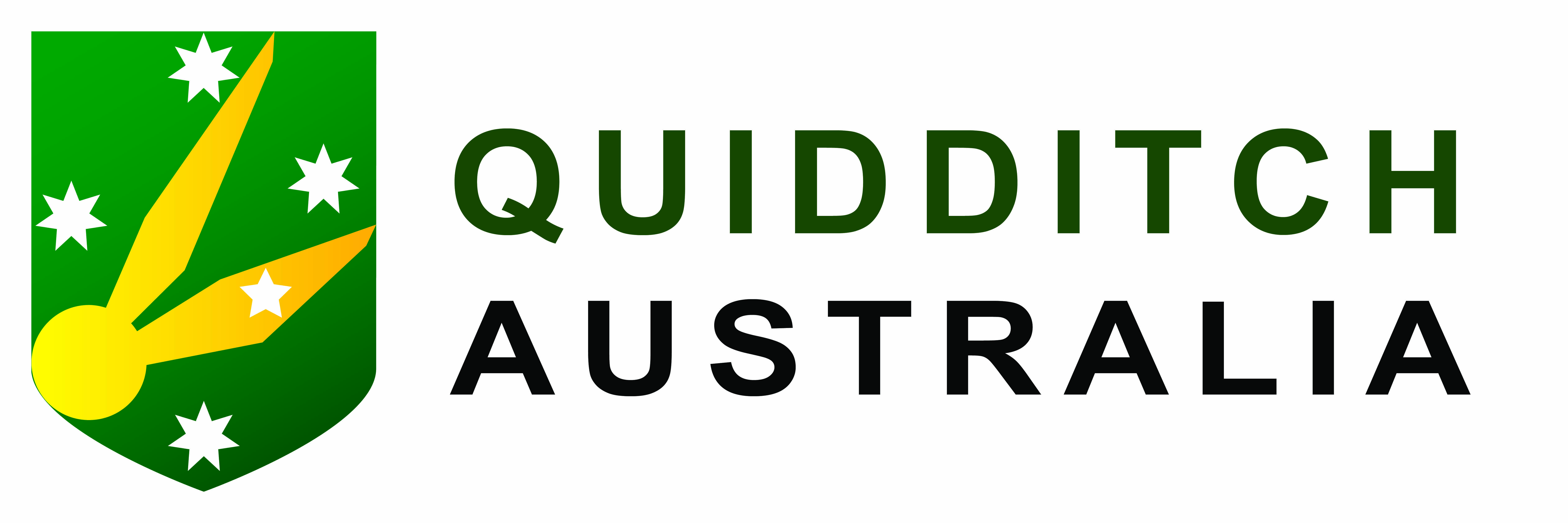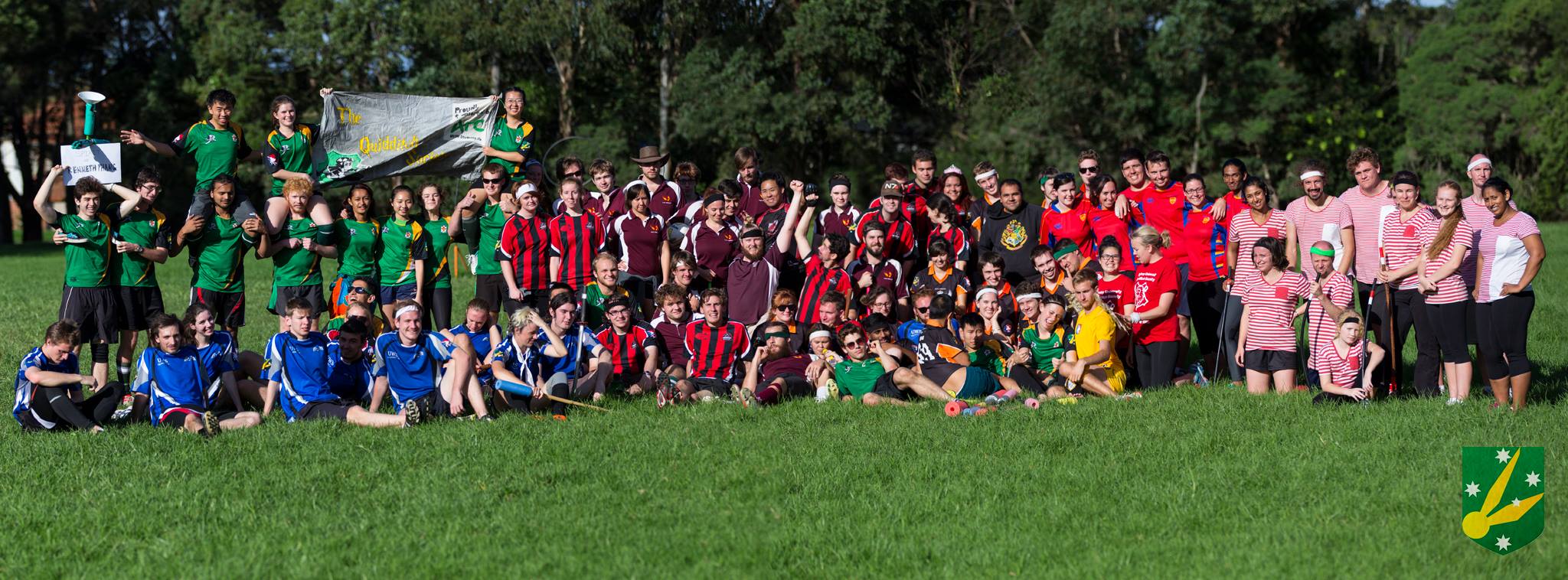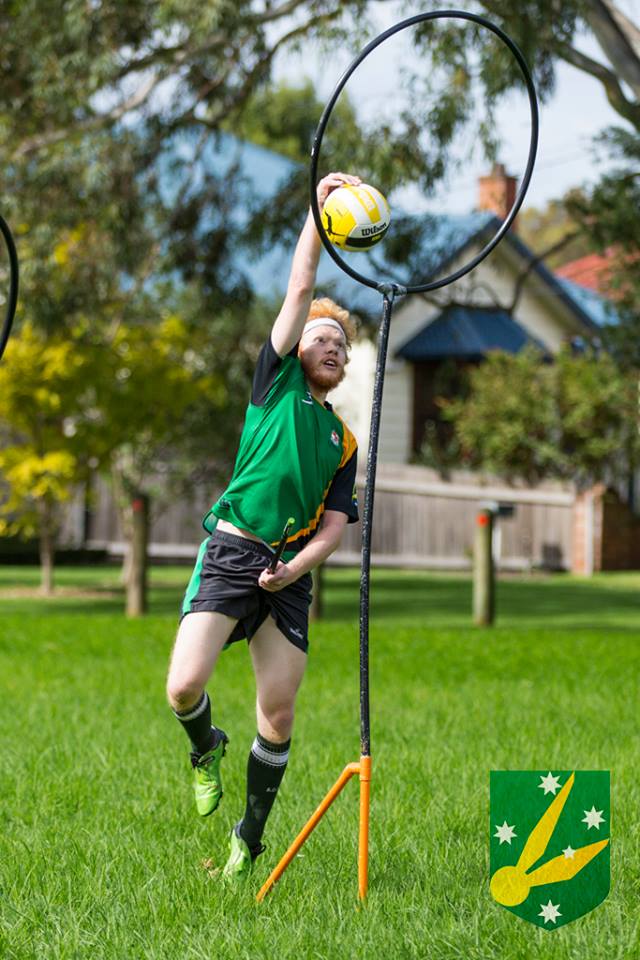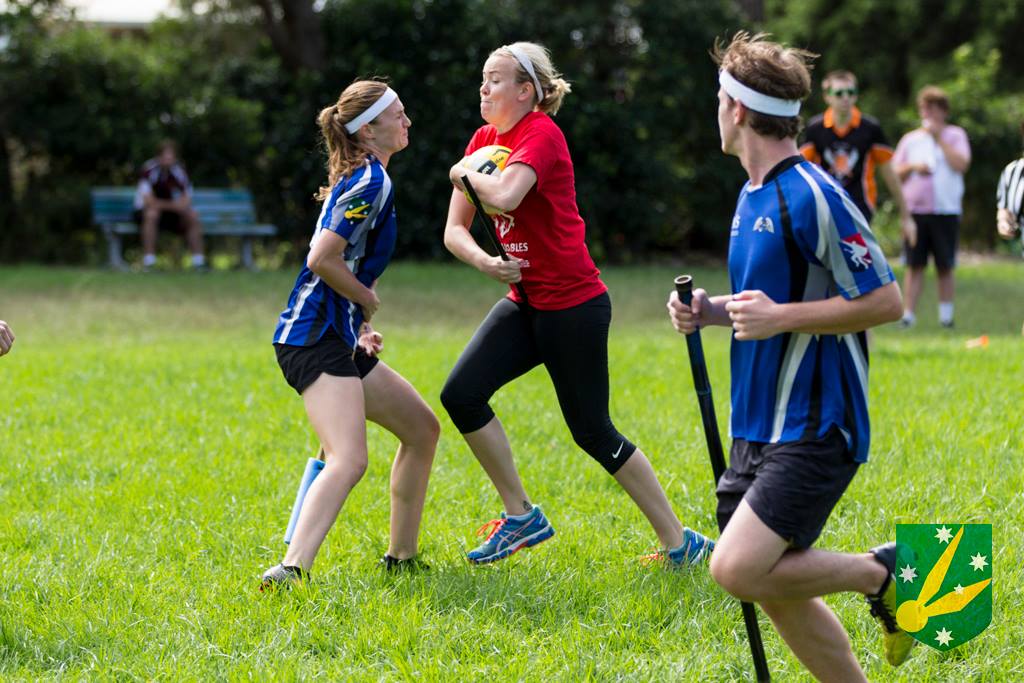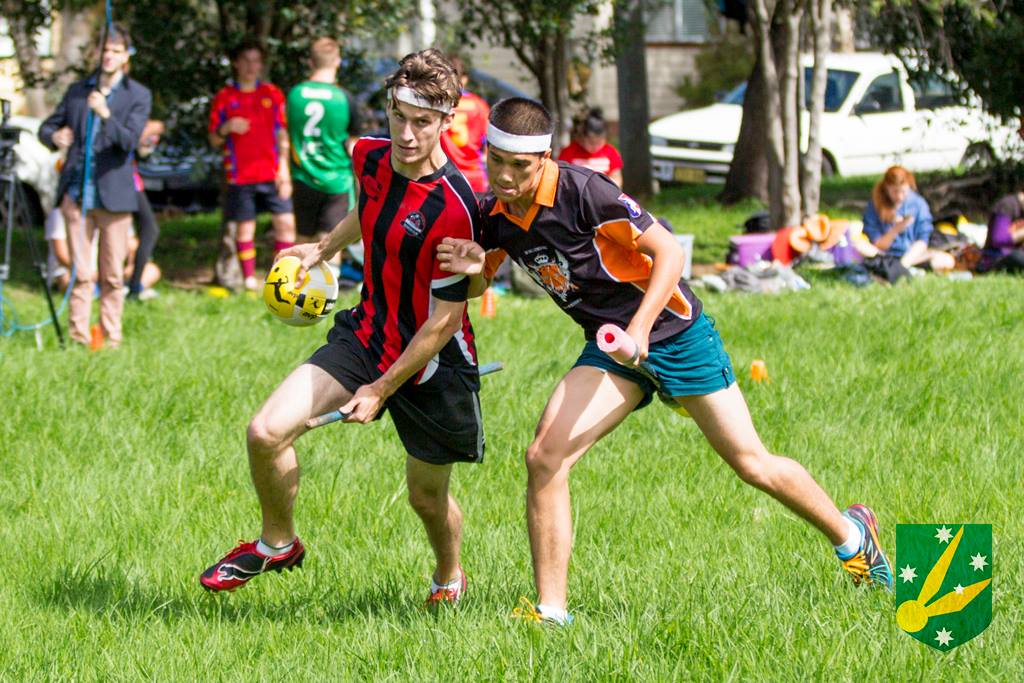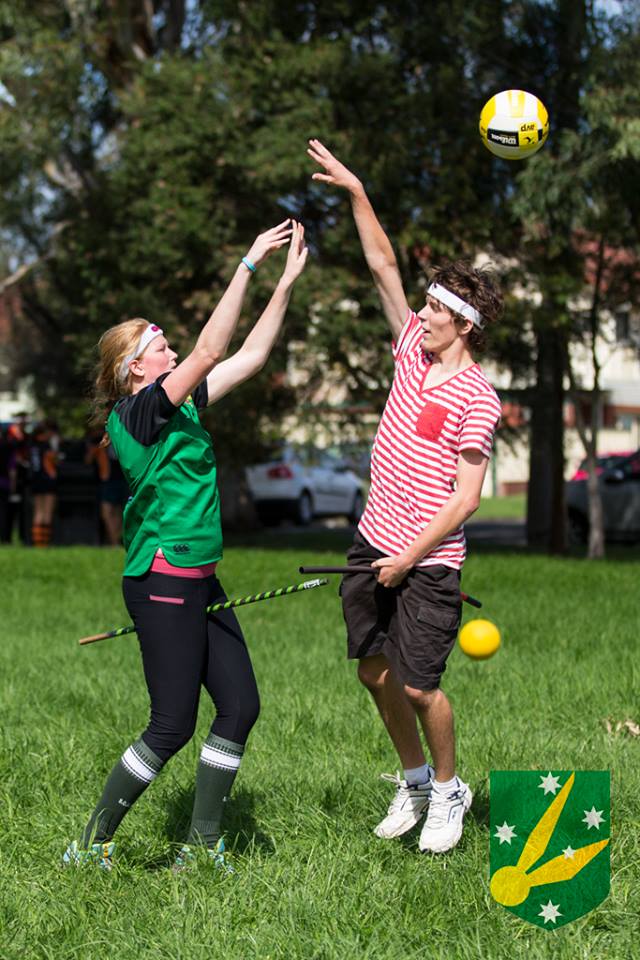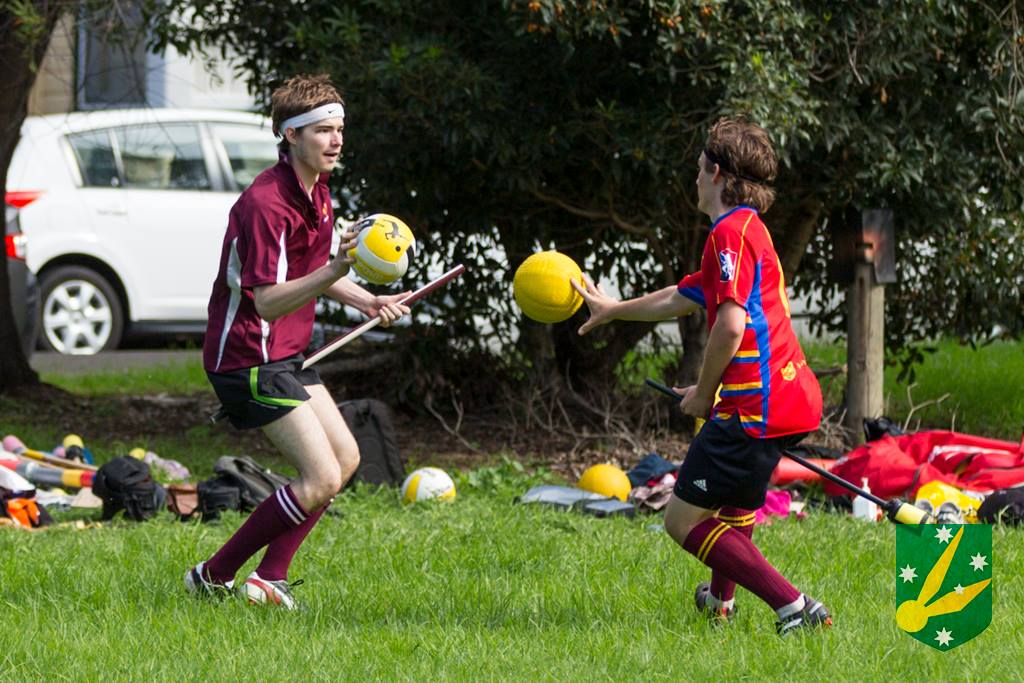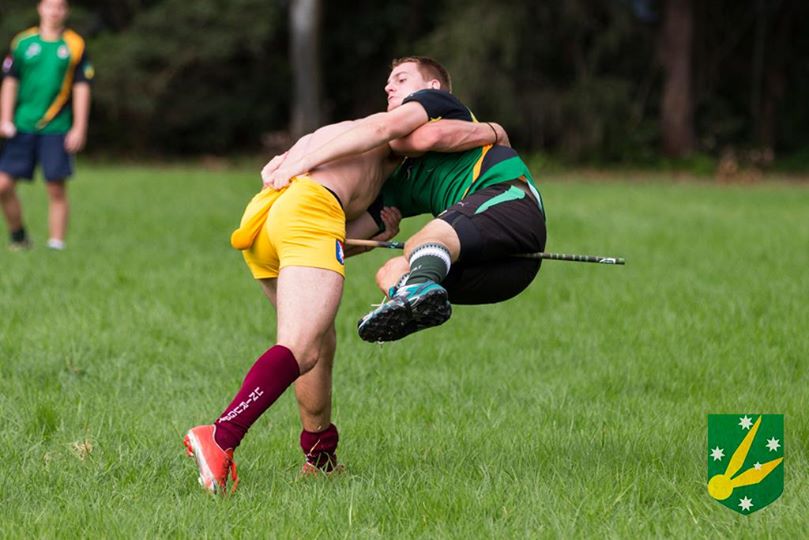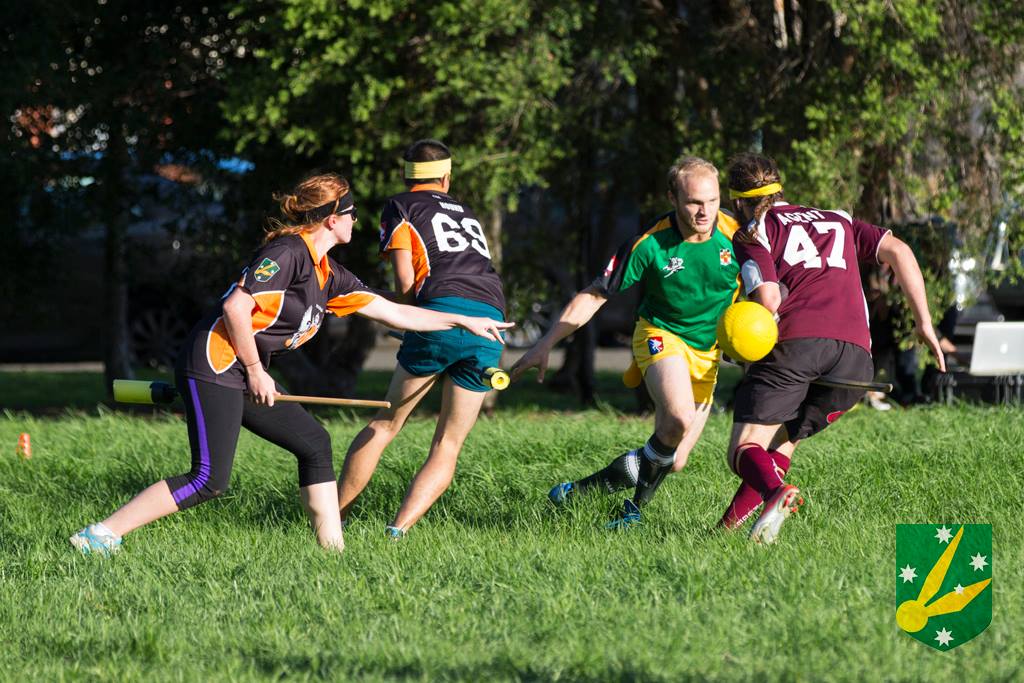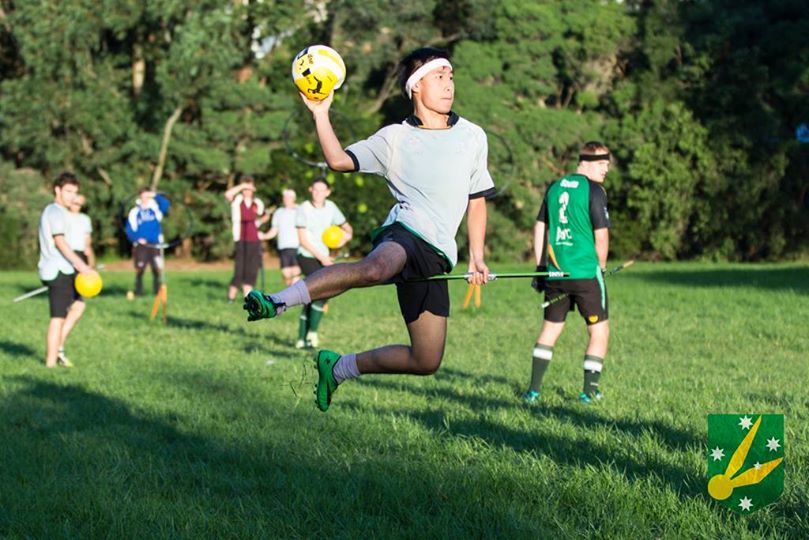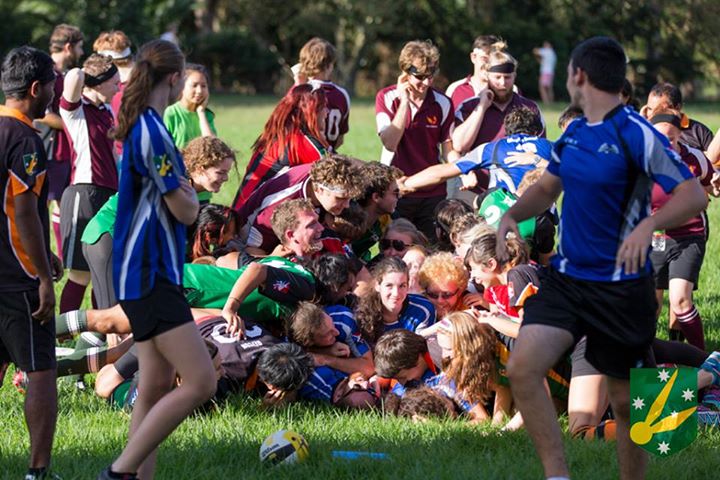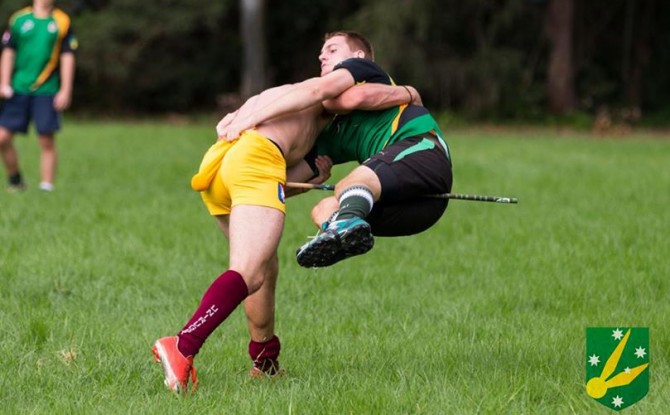
April Triwizard Report
For April’s installment of Triwizard competition, six teams from Sydney and Newcastle ventured south to visit the Wollongong Warriors, who hosted affairs at their nifty little abode in Robinson Park for the second time. September 2013’s Illawarra excursion had been a fantastic day out and nothing would stop this time out from matching that success, not a couple of missing teams nor the restrictive snitch boundaries nor an apparent recent strike by the local council’s lawn-mowing fraternity.
World Cup buzz was the order of the day. World quidditch’s great and mystical centrepiece had been run and won just a week previously, complete with magnificently boisterous representation from the University of Sydney Unspeakables, who were the first Australian club to make the journey. Australia’s ambassador team returned seasoned and hardened. Her ambassador snitch returned freshly glorified and unionised, resplendent with American solutions to the conveniently prescient problem of difficult snitch boundaries. The surrounding border of public road and private housing lining the field ensured that off-pitch seeking this month was out of the question. The complexion of the day was therefore changed as each snitch camped inside the hard boundary awaiting the sudden madness of a seventeen minute seeker release.
This created a day of slightly shorter games on average, but such a trend was surely perversely welcome to the Wollongong Warriors in their first match of the day. Chris Rock’s first snitch catch of the season, emphasizing the demoralising depth the Snapes have even in this most specialised position, mercifully ended a 170-0 thrashing before the score could get worse. A bigger margin would not have befitted the efforts of the Warriors. Much like Sydney and Macquarie in March and one suspects much like more teams later on this season, Wollongong were perfectly adequate in their general performance but just not able to stay with the UNSW juggernaut.
Minh Diep and Phil Vankerkoerle started together on this occasion, with Andrew Culf kept on ice. Diep scored in the opening minute, but play was otherwise slow and slippery in the early exchanges. The dew-heavy long grass of the pitch clearly affected the handling of both teams. Perceptions were perhaps amplified by unfair comparisons to recent select World Cup viewings that were fresh in the memory, but even by usual Triwizard standards, play was clearly proceeding turgidly.
Vankerkoerle provided much of the necessary spark, scoring twice early and having a hand in other goals as UNSW took control of the match. By the ten minute mark their lead was 70-0. With the result reasonably secure and their flowing rhythm back, the Snape train began to roll through the madly defending Warriors’ solid structure. By the time Rock caught the snitch, fourteen goals had been managed, with Minh Diep just taking the scoring honours with five goals.
As if UNSW’s dominance in depth wasn’t already clear enough, they annihilated any doubts by comprehensively sweeping aside a quality team, largely without requiring the services of their star chaser Andrew Culf, who barely featured and was not to be found on the scoresheet. The hosts would turn around in an hour’s time for the second ranked game of the day as well, against the Macquarie Marauders. But before then, two games of very different competitive quality were to be had.
The Macarthur Weasleys, albeit highly depleted, nevertheless brought a team to compete for a second time. First they would face the Newcastle Fireballs, who were also present in March but in decidedly smaller numbers. Later contests today would see the restocked Fireballs play ranked for the first time this season. This first match would be an acid test of their very new look line-up, to see how untried figures likes James Putin, Bryson Davey and Liam Dawson would go gelling with trusty old hands in funky new arrangements under the untested leadership of new captain Joshua Naismith.
So much was new for this match on both ends of the pitch, but familiar faces dominated play. Captain Arfy Papadam ran play for his Weasleys as always, with special guest Morgyn Benstead expertly keeping the beater contest alive and even. Newcastle were never under threat though, with captain Naismith, anchor Roy Velting and marquee man Dameon Osborn all calmly using their experience and power to comfortably execute, leading the Fireballs to a 140-10 win.
Following this though, was a high quality tight tussle between UWS and Sydney, unranked only due to the understandable Unspeakable shortages in the wake of having only returned from across the seas in recent days.
Captain Luke Derrick and star chaser Cameron Brown were present however, with Brown’s early goal matching Corey Ingold-Dawes’ first minute effort. Sydney’s beater unit announced themselves at QUAFL 2013 and made waves in America where they impressed many, so by now they were in their element, able to just about stay with any beater pairing.
Ingold-Dawes was proving to be the early X-factor, with his hat-trick establishing a 30-10 lead. Captain Hannah Monty, as she so often does, slowly played her way into the match, taking control in the middle stages as UWS crept away with goals to Monty, Daniel Ormshaw and Juan Demin. Sydney were never far away though, with their three goals keeping the match tenuously alive at 60-30 by the lifting of the seeker floor. UWS deserved the win though and were duly assured it by Christian Barquin’s catch.
Last time quidditch was here in Wollongong, the Warriors’ rivalry with the Macquarie Marauders was just heating up. Wollongong’s Midwinter triumph was fresh in the memory and both teams struggled at a September Triwizard dominated by the UNSW and UWS powerhouses that made up the four team line-up. In a thrilling battle for pride, victory came down to the snitch, so it was perhaps a vague surprise that the always snatchtastic Warriors came up short. This match-winning catch for Macquarie definitively marked the arrival of Daniel Commander, who before September was known as a relatively undemonstrative relief chaser, but went home as the country’s new seeking prodigy. By QUAFL he was arguably the best of all nationwide, leading the Marauders to within inches of ultimate glory.
But here Macquarie were without Commander for the first time since then. So further Daniels took up the slack of maintaining the name’s quidditch pride. Daniel Lowe and Daniel Claxton dominated their respective sides of the scoresheet, each scoring three times in a pair of frenetic chaser performances as evenly matched as the rest of their teams were across the board. Claxton took only forty eight seconds to put Macquarie on the board. Less than a minute later Lowe had equalised. A bit later on Claxton scored again, so Lowe saw fit to reply less than sixty seconds subsequently once more. But the intervening five minutes were a roller-coaster, with both teams’ chaser units finding space in centre-field but being unable to quite execute at the finish.
When Lowe completed his hat-trick, Wollongong were 30-20 up and luck seemed to be on their side as further missed and disallowed opportunities passed the Marauders by. It was a faster and more back and forth neck-turner of a match than the score suggested. Both teams’ beater strength lay in their last line defence, with Hannah Davidson and Morgan Thorndyke both immovable at the goal face.
Macquarie’s depth began to shine through but they continued to waste chances, aided by some adept adroitness in goal from Brandon Heldt. Wollongong captain Jacob Fleming broke the Danielopoly in the fourteenth minute, taking Wollongong twenty clear, but Claxton hit back for both Team Daniel and Team Marauder quickly afterwards. A quick follow-up from Scott Palmer tied the match, which remained at 40-40 as the seekers took flight.
Dan Phipps then threw a spanner in the works, throwing his own name into the ring of Daniel. Phipps gave Macquarie their first lead of the match and Team Daniel their biggest, 70-20 over the mortals of humanity.
Then a Daniel caught the snitch. It was long clear that the final snatch would decide the meaningful Macquarie vs Wollongong portion of the contest. So the big question was which Daniel had smeared themselves in glory. It wasn’t Commander, absent as he was. It wasn’t Lowe this time, as it so often is. It was, more unusually, the Daniel of the Claxton variety.
It was the Marauders who won therefore, 80-40 over the continually luckless Warriors in a tense but frustrating match which both teams had ample opportunity to put to bed early but couldn’t.
Before UWS and Newcastle prepared to face off for the first time this year it was time for the Weasleys to front up, hoping to give UNSW any kind of substantial workout. The Snapes, with fresh troops at their disposal and a ranked clash against a more confident Marauders still to come, relied on many of their ‘second string’ players (ala some of the best players in the country) to blow the Weasleys away.
Macarthur, with further personnel at their disposal since their early morning game, showed greater attacking flair, with Sam Legeret in particular penetrating deep into the Snape keeper zone in wily support of Arfy Papadam’s anchoring runs. With the result well and truly clear and the snitch nearly caught, the Weasleys to their credit manage to do what not even the experienced and polished Warriors unit could do and put a goal through the UNSW hoops. But this would be their sole triumph in a gallant 130-10 loss.
For the Newcastle Fireballs, it was finally D-Day. Newcastle’s first ranked match of the season pitted them against UWS, the bogey team who had caused the Fireballs their greatest problems consistently throughout 2013. But this was a fresh and revitalised Newcastle unit. It was the most immediately impressive of these rookies who opened the scoring, James Putin establishing an early Newcastle lead which Dameon Osborn quickly doubled. Daniel Ormshaw’s attempt at a quick restart was scuttled by the attentions of Putin, who promptly earned a yellow inside the first three minutes of his official career for not retreating from the keeper zone.
Bianca Connell utilised the extra space of the seven-on-six advantage to hit back, before Dom Bell crucially freed Newcastle of what had until then been total beater dominance from the beleaguering Tom Russell and the unswerving Kalinda Gibson. With bludger control emphatically secured, the momentum shifted towards UWS, who wasted no time in taking the lead through consecutive goals to Corey Ingold-Dawes and Hannah Monty.
Newcastle’s improved chaser depth consistently put UWS under pressure, but the Thestrals’ beater dominance was too thorough, allowing them to dictate play and slowly draw away.
Ingold-Dawes and Connell both added a second, before Juan Demin continued to display the added effectiveness of UWS’ new generation, taking the margin beyond snitch danger. It was Newcastle’s new captain Joshua Naismith who ruthlessly snapped the snitch, just seconds after being released to pursue it. But the game was already out of reach, as he recognised in haring straight after the tag rather than consciously defending. With Newcastle’s catch, UWS settled for a 70-50 victory but one which after the opening few minutes never looked in any doubt.
Newcastle’s season had started promisingly in patches, but more would be needed if they were to overcome the Unspeakables, who pushed UWS far closer in their earlier match. However Luke Derrick had sustained a hand injury in that defeat, ruling him out for the remainder of the day. This presented a clear opportunity for the Fireballs to take advantage of a team whose balance changes completely without its inspirational leader. However Sydney countered smartly, shifting Cameron Brown to beat with Paul Harrison, who was already ably covering for the absent Rob Wells.
With Brown occupied beating and Patrick Ward still in the States after his world cup sojourn, Newcastle should have had the superior chaser firepower to overrun the Unspeakables. Certainly the lack of penetration hindered Sydney early on and they led only 10-0 after five minutes dominated by a tight beater tussle. The power balance with the quaffle was then redressed when James Putin was controversially sent off for an un-malicious albeit extremely clumsy tackle, ending up both high and behind.
Still, Newcastle only needed to stay within thirty shortly, as seeker Liam O’Callaghan was yet another absentee for Sydney. But even that was proving difficult. The astuteness of shifting Brown to beat became clear as time passed. His dominant athleticism was such that despite his relative inexperience in the role, his combination with Harrison was once again sufficient to deprive the struggling Newcastle beaters of possession. With their beaters’ total bludger control affording them the room to move, Sydney’s rotating roster of experienced and heartily solid chasers, led by Belinda Toohey and Ajantha Abey, made wily progress on the scoreboard.
The Fireballs could only score once as Sydney drew safely clear, then sealed a striking 90-10 win when Isabella Moore pounced on the snitch, ably covering in O’Callaghan’s absence.
For the second straight month, UNSW and Macquarie clashed. Macquarie entered this match full of confidence having professionally worn down the potent Warrior threat in their tight victory. But Andrew Culf’s quiet day had been building to now. He proceeded to score a goal per minute over the first five, unanswered by either opposition of team-mate. 50-0 was a decisive and confidence sapping start for Macquarie.
The Marauder beaters are always competitive in the bludger contest, especially with their full quality quota available. The rotating pair of hulking keepers Dan Phipps and Scott Palmer provided strength from the back, feeding Daniel Claxton’s direct and efficient charges. But without the consistent firepower across the field that characterises a chaser unit like UNSW’s, the Marauder attack lacked a certain variety and therefore was increasingly easy for UNSW to structure a defence against and easily pick off.
Quaffle possession was even more evenly shared this time around than it had been in March, with the Marauders attacking just as effectively from their own half as the Snapes were. But just as against Wollongong, they could not find a way to break through the last line and efficiently finish. 50-0 had become 80-0 by the ten minute mark, before Laura Bailey finally scored only the second goal against UNSW in 45 minutes of quidditch for the day. It came in an appropriately unlikely way. With the firm Snape defence pinning Bailey in her own half, this particular play was a lost cause for the Marauder captain who was left no option but to fire a looping lob towards the powerlessly covered Claxton at the hoops. But the quaffle happened to descend straight through the middle hoop and Macquarie were suddenly on the board.
Andrew Culf continued on his merry way to seven goals for the match, but the pace of UNSW’s procession slowed significantly. Play continued beyond the half an hour mark thanks to snitch Dameon Osborn’s inevitable monstering of his hapless seekers. The second half of the match was characterised by a marked tactical shift from the struggling Marauders. Unable to control the Snapes’ march towards another belting, Macquarie shut up shop completely, slowing the game to a crawl by holding onto the quaffle for long periods inside their own half. UNSW’s ever professional beaters refused to break formation and force the play, preferring to let Macquarie sit on their heels safe in the knowledge that their defensive structure was set and ready for anything that might eventually come up at them.
To their credit though, the Marauders shook things up and the tactics can be said to have succeeded to some extent, as Bailey managed a second goal of her own and Phipps added a third. Meanwhile, UNSW were only able to score five goals over the last fifteen minutes of match, thanks largely to Minh Diep’s late surge towards a match tally of five for himself. But the match was already lost in the early stages, leaving lingering questions of how next time might go if Macquarie play that way straight from brooms up.
At long last, Osborn was bested, when Nick Allan spectacularly vaulted over the snitch’s shoulder and snagged the tag from above, finalising a 180-30 win for the peerless Snapes.
The third game of the Weasleys’ day was against UWS, completing a cruel trilogy of fiery quidditch indoctrination at the hands of an improved and physically powerful Newcastle, the No.1 ranked UNSW, and their great No.2 rivals UWS. But this was a day of learning for the rookie team and there is no better learning experience than coming face to face with the best of the best. UWS were not exactly the best of their best here though, utilising what is these days the rare opportunity to face a definitively weak opposition. Many usual positions shifted, led by captain Monty who took up the mantle of beating. Fellow beater Dom Bell also had the distinction of scoring a goal, when Ingold-Dawes broke clear with no Weasley keeper at home, allowing him time to toss the quaffle up in front of the hoop for Bell to propel a bludger at.
It was all a bit mad-cap for UWS as they proceeded to effortlessly dismantle their opponents, with the relaxed Thestrals making room for the Weasleys to have a bit of fun, or disrespecting them entirely with their antics, depending on your perspective. But no one could deny that the match was an enjoyable lark to behold and UWS still did their work efficiently, winning 180-20. It was Chrystal Player who finished the match by spectacularly surprising all, herself more than anyone, with a first ever snitch catch.
With the vaudevillian diversion over and done with, it was serious business time again. The last ranked match of the day saw the hosts take on the Newcastle Fireballs, the great old rivals finally meeting at long last, for the first time since Midwinter. Wollongong have come a long way since then, kicked off by their breakthrough efforts that weekend in Newcastle. The Fireballs, though impressive in reaching the QUAFL semi-finals, have nevertheless come rather back to the pack. Clashes between Newcastle and Wollongong have historically been one-sided, with a narrowest margin of sixty and an average score of 145-29 over eight perfect wins from eight for the Fireballs. But it was clearly not going to be the same story today, with these teams now evenly matched in most areas.
Captain Naismith led from the front, opening the scoring after two minutes. But it was the Warriors who controlled the early moments, with Brandon Heldt then Daniel Lowe scoring. Lowe added a second after six minutes and it was 30-10 to Wollongong and a momentous upset (in a historical context at least) was brewing.
Hannah Davidson and Aman Nalli were immense, controlling the Newcastle beaters and providing the backbone to allow their chasers early supremacy. But the chaser firepower of the Fireballs was superior and they slowly took control. The Fireballs had quaffle control and looked the clearly better team, but their finishing was poor, with the Warriors consistently better at the goal mouth. In fact, everything felt distinctly similar to the Macquarie vs Wollongong morning match. It should perhaps instead be noted how Wollongong so unravelled the finishing ability of both teams more than focusing negatively on the Marauder and Fireball efforts.
Just like this morning against Macquarie, Wollongong found themselves somehow leading the majority of a match they looked a little outclassed in.
Newcastle slowly overran the Warriors though, with Dameon Osborn injected to work alongside the indefatigable Putin. This lopsided the chaser contest even further, but it was Owen Sherwood who arguably made the bigger difference, with his bustling forward-barging momentum deep in the keeper zone serving very much as a lesson in how to finish for his struggling team-mates.
A pair of goals each to Osborn and Sherwood gave Newcastle a 50-30 lead, with the seekers now released and engaged in an epic struggle. Both Daniel Lowe and first Dameon Osborn then Joshua Naismith came within inches of their own grabs. The Warrior defence held firmer than ever, holding Newcastle’s lead at 20. A runaway solo goal from Ezekiel Azib then narrowed it to a one goal game, with Azib, as always, more amped than anyone on his team or in the entire world to have scored his well-timed goal.
The hero of the day was Daniel Lowe, who pounced on the other side of the field as a panicked Newcastle tried once again in vain to assault the Wollongong goal. Lowe’s catch handed Wollongong a history-making victory, the first over Newcastle in nine attempts, by 70 points to 50.
With ranked play finished and the noble hosts delirious with their momentous and well earned victory, the cool afternoon concluded with a final match between the Marauders and the Unspeakables. For such a relaxed feeling wind-down to the day it was an awfully high quality match between two teams in reasonable form. Both were short of personnel and are still far from the peak of their potential, but for the sake of this particular match-up it was perfect.
In a low-scoring scrappy struggle, neither team ever looked like taking total control. The Marauder chasers generally had the better of their consistent but less powerful Sydney counterparts, but like against Newcastle, Paul Harrison and Cameron Brown negated the advantage.
A late surge from Sydney levelled the match at 30-30 and the score stayed that way indefinitely, up to and beyond the seeker floor. So with a game up for grabs, Daniel Claxton once again stepped up, beating Isabella Moore to his second match-winning catch of the day.
The Marauders’ tight win over the Unspeakables was the final piece in the puzzle of trying to work out a hierarchy within the pack this year. But it certainly didn’t make things any clearer. The promise of March was confirmed for UNSW, who are on another level. But as things stand, there is little to differentiate between the whole set of UWS, Macquarie, Wollongong, Sydney and Newcastle. UWS at their best are still a step beyond, but they are struggling to find their best this year and it won’t get better easily with further disruptions afoot for upcoming tournaments. Newcastle in turn are a step below, having lost three straight games and overcoming only the shorthanded rookie Weasleys. But as their clash showed, the gap between the Thestrals and the Fireballs is a small one, a gap which somehow three whole other teams appear to lie within.
The supremacy of UNSW, but the brilliant quality at the head of so many teams, was emphasized at the end of the day when the NSW contingent of the recently selected Australian Global Games squad took on a large team of random all-sorts. It was the UNSW contributors to the mercenary opposition who made the most impact, with Phil Vankerkoerle, Holly Shuttleworth and Nick Allan all impression. But encouragingly, it was the elite squad who won, as one would hope they always will, 140-40.
Results
| University of New South Wales | 170* | vs | 0 | Wollongong Warriors |
| Newcastle Fireballs | 140* | vs | 10 | MacArthur Weasleys |
| University of Western Sydney | 90* | vs | 30 | University of Sydney Unspeakables |
| Macquarie Marauders | 80* | vs | 40 | Wollongong Warriors |
| University of New South Wales | 130* | vs | 10 | MacArthur Weasleys |
| University of Western Sydney | 70 | vs | 50* | Newcastle Fireballs |
| University of Sydney Unspeakables | 90* | vs | 10 | Newcastle Fireballs |
| University of New South Wales | 180* | vs | 30 | Macquarie Marauders |
| University of Western Sydney | 180* | vs | 20 | MacArthur Weasleys |
| Wollongong Warriors | 70* | vs | 50 | Newcastle Fireballs |
| Macquarie Marauders | 60* | vs | 30 | University of Sydney Unspeakables |
